PROXY MONITOR 2013
FINDING 4
2013 Proxy Season Wrapping Up
More shareholder proposals have been introduced this year, but their success rate is down.
ABOUT PROXY MONITOR
The Manhattan Institute’s ProxyMonitor.org database, launched in 2011, is the first publicly available database cataloging shareholder proposals and Dodd-Frank-mandated[1] executive-compensation advisory votes at America’s largest companies. This is the 19th in a series of findings and reports drawing upon information in the database, each of which examines shareholder activism in which investors attempt to influence corporate management through the shareholder voting process.[2]
|
Corporate America’s proxy season—in which publicly traded companies hold their annual meetings and vote on various matters, including proposals introduced by shareholders—is nearing its close. By June 4, 210 of America’s 250 largest publicly traded companies had filed proxy documents with the federal Securities and Exchange Commission, with 191 of these companies having held annual meetings as of May 29.[3]
With 84 percent of proxy statements filed and over 75 percent of companies reporting voting results, three broad trends have emerged for 2013. First, the number of shareholder proposals is up marginally: with 1.27 proposals introduced per company, there has been more shareholder activism of this type than in any year since the Dodd-Frank financial reforms were enacted in 2010. Second, the success rate of such proposals is down: only 7 percent of shareholder proposals have received the support of a majority of shareholders, the lowest success rate of any year in the Proxy Monitor database, dating back to 2006. Third, and partly explaining the second trend, the composition of shareholder proposals has shifted: relatively more proposals in 2013 have involved social or public policy concerns unrelated to executive compensation or corporate governance (led by proposals involving corporate political spending or lobbying, which, as in 2012, constituted a plurality of all proposals); and those proposals related to corporate governance were more likely to involve issues without broad shareholder support, such as separating the positions of chairman and chief executive officer.
This finding explores these trends in more detail. Part I examines the incidence, composition, and sponsorship of shareholder proposals in 2013, as compared with recent historical norms. Part II offers a special focus on the shareholder proposal activity of labor-affiliated investors other than pension funds for public employees, the subject of Finding 3. Part III looks at 2013 voting results.
I. Incidence, Composition, and Sponsorship of Shareholder Proposals
The 1.27 shareholder proposals introduced at Fortune 250 companies to date in 2013 is somewhat higher than in 2012 and 2011. This increase is notable in that two of the four largest “corporate gadflies” (individual investors who, along with family members and family trusts, repeatedly file similar shareholder proposals at multiple companies) have been inactive this year: Emil Rossi and Evelyn Davis.
The introduction of shareholder proposals does, however, remain significantly below the level seen between 2006 and 2010, when the Dodd-Frank Act was passed. In part, this decline is due to that legislation’s mandating that public companies hold advisory votes on executive compensation, which removes the rationale for shareholder proposals seeking such votes (previously, shareholder proposals seeking “say on pay” votes were regularly introduced) and has refocused the attention of some activist investors on marshaling opposition to executive-pay packages rather than introducing shareholder proposals. In addition, certain classes of proposals regularly introduced in earlier years—such as those seeking to “declassify” boards of directors to elect full boards annually and those seeking to require directors to obtain the support of a majority (versus a plurality) of shareholders for election—have become less frequent, in significant part because many of the largest American companies have now adopted such practices.
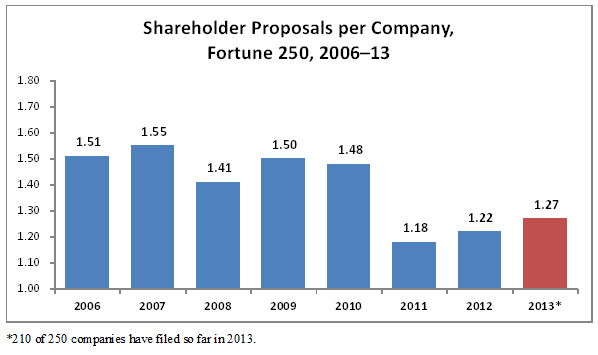
Composition of Shareholder Proposals
Some 42 percent of shareholder proposals in 2013 have involved social or public policy issues not directly related to corporate governance or executive compensation—up from 37 percent across the entire 2006 to 2013 period. Proposals related to executive compensation are less common, as has been consistently the case since the 2010 Dodd-Frank reform mandated executive-compensation advisory votes and removed the need for shareholders supporting such votes to introduce proposals seeking them. Executive-compensation-related proposals have, however, been somewhat more common in 2013 than in 2011 (when they constituted 14 percent of all proposals) or 2012 (16 percent).
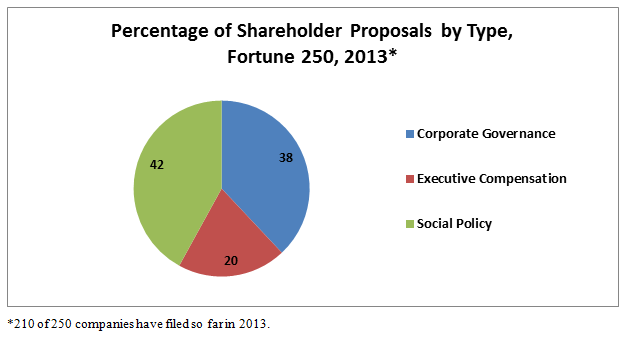
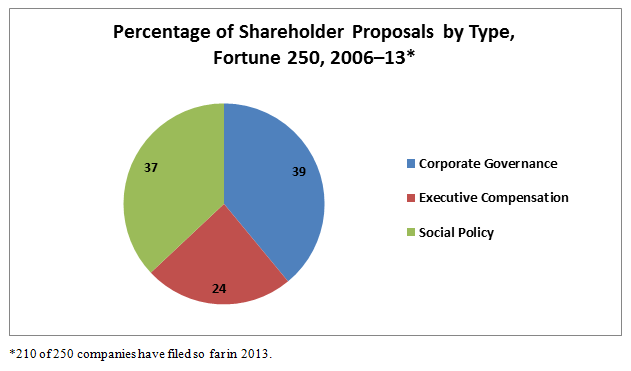
Looking at more specific subtypes of proposal, those related to corporate political spending or lobbying have, as in 2012, constituted a plurality of all shareholder proposals—21 percent of the total, up from only 10 percent across the full 2006–13 period. The second most common type of proposal has sought to separate the chairman and CEO positions; these proposals constituted 12 percent of all those introduced, up from 8 percent across the full range of years dating back to 2006. Proposals relating to the environment (12 percent) and equity-compensation rules for management (11 percent) were also common, and slightly more so than in previous years.
Some 7 percent of shareholder proposals related to voting rules in 2013, down from 14 percent across the full 2006–13 period. This drop is partly due to a greater percentage of companies adopting majority voting rules for directors—thus obviating the need for shareholders preferring such a rule to introduce proposals seeking a change to majority voting. Also, only one proposal in 2013 has sought cumulative voting for directors (allowing shareholders to aggregate multiple votes—up to the number of board seats up for election—behind a single director candidate); such proposals constituted about one-third of all voting proposals introduced across the broader period, most commonly introduced by the corporate gadfly Evelyn Davis, who has been inactive in 2013.
In addition to voting rules, the percentage of shareholder proposals related to social or public policy concerns other than corporate political spending or environmental issues has fallen in 2013: only 9 percent of all shareholder proposals relate to “other” social or public policy issues this year, versus 18 percent dating back to 2006. (In other words, even though the percentage of social or public policy proposals has increased by 5 percentage points in 2013, this rise is wholly explained by the introduction of more proposals related to political spending or lobbying or the environment; the share of all other social/policy proposals has halved.) Some of the policy-related proposals common across the full 2006–13 period are no longer relevant—including those urging companies to adopt statements of “health-care reform principles” during the debate over the federal Patient Protection and Affordable Care Act[4]. In addition, proposals related to human rights and animal rights have been less common in 2013, perhaps because the scant shareholder support for such proposals in recent years has fallen below the Securities and Exchange Commission’s resubmission thresholds.[5]
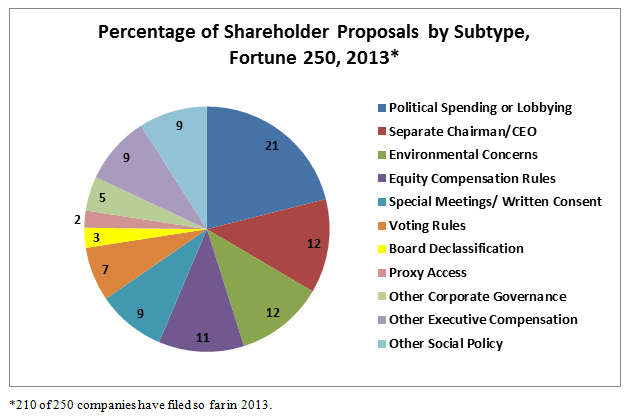
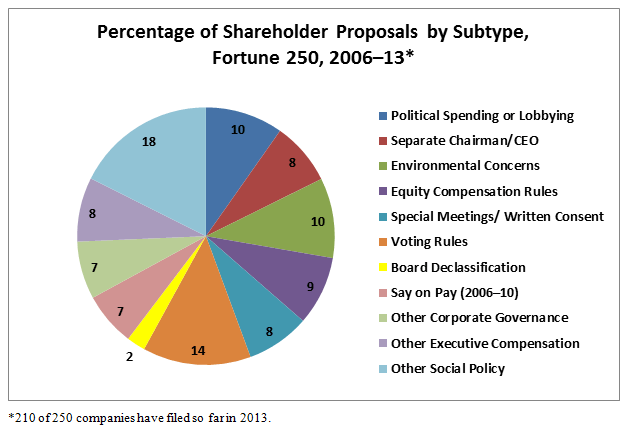
Shareholder Proposal Sponsors
The breakdown of shareholder proposal sponsorship in 2013 closely tracks that across the 2006–13 time span. Particularly notable is the near-identical level of proposal sponsorship among the four largest corporate gadflies in 2013 (25 percent of all proposals) versus historical norms (26 percent), given that two of the four gadflies and their family members—Evelyn Davis and Emil Rossi—have been lead sponsors of no shareholder proposals this year. Thus, 25 percent of all shareholder proposals in 2013 were sponsored by two individuals and their family members and family trusts: John Chevedden and Kenneth Steiner.
Also of note in 2013, religious organizations, social investors, and public policy groups sponsored a share of proposals equivalent to their earlier levels, 25 percent, after dipping to 22 percent in 2012. In part, this rebound is attributable to the reemergence of Catholic orders of monks and nuns as proposal sponsors this year: after sponsoring only four proposals at Fortune 250 companies in 2012, such groups have sponsored 13 so far in 2013.
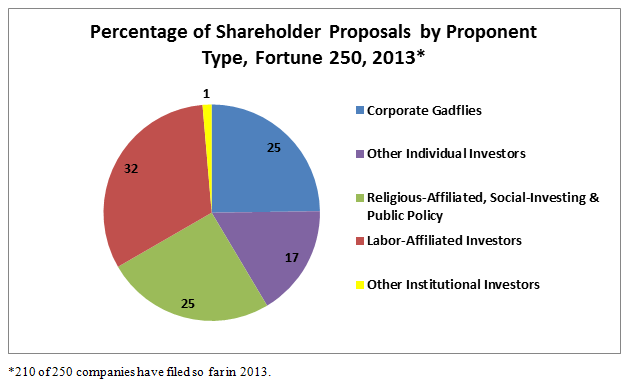
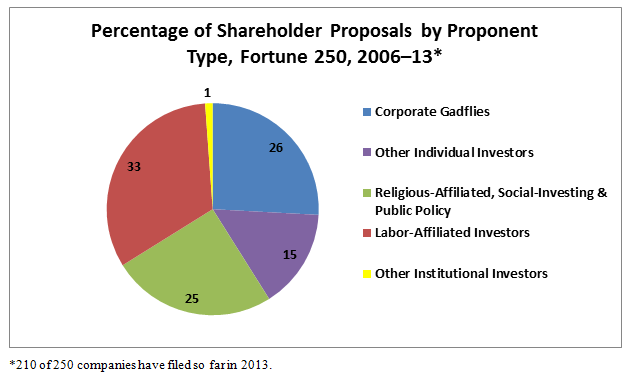
II. Special Focus: Labor-Affiliated Pension Fund Proposal Sponsors (Non-State/Municipal)
In 2013, consistent with the full 2006–13 period, roughly one-third of shareholder proposals have been sponsored by investors affiliated with organized labor, chiefly through retiree pension funds. Proxy Monitor Finding 3 analyzed in some depth shareholder proposal activism by state and municipal pension funds—particularly the most active funds, those affiliated with New York City and State—which have sponsored almost 28 percent of all labor-affiliated proposals faced by Fortune 250 companies, dating back to 2006. More than two-thirds of labor-affiliated proposals, however, have been sponsored by pension funds affiliated with private-sector labor unions (e.g., the American Federation of Labor–Congress of Industrial Organizations [AFL-CIO]) or by funds affiliated with public workers but not through a state- or local-backed plan (e.g., the American Federation of State, County, and Municipal Employees [AFSCME]).[6]
The AFL-CIO has been the most frequent such proponent in 2013, sponsoring 12 proposals (two through its affiliate Utility Workers Union), followed by AFSCME, sponsoring ten. The pension funds affiliated with these two unions have sponsored more shareholder proposals this year than any other institutional investor save the New York State Common Retirement Fund (sponsor of 13 proposals)—fourth and fifth overall behind the New York State fund, Mr. Chevedden, and Mr. Steiner. Across the full 2006–13 period, the AFL-CIO (and its Utility Workers affiliate) has sponsored 101 shareholder proposals and AFSCME 99—more than any other institutional investors save the New York City pension funds and Comptroller’s Office.
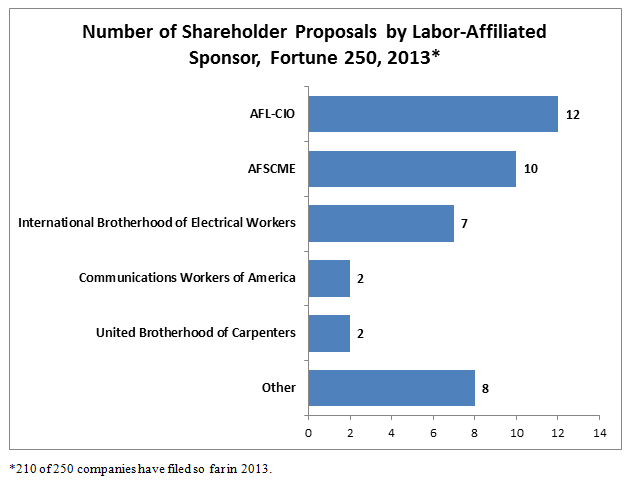
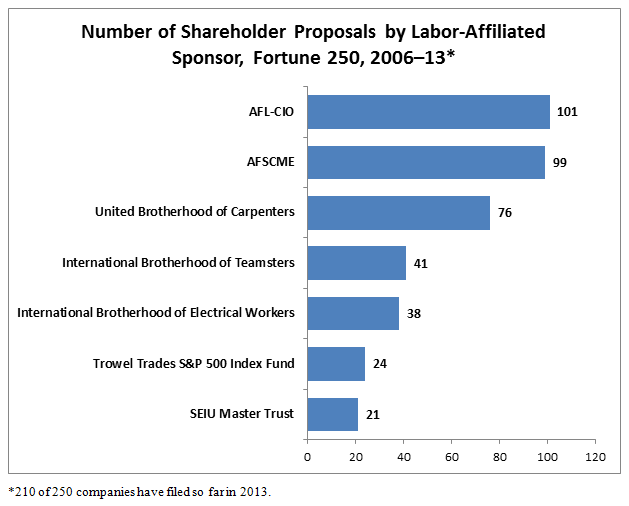
United Brotherhood of Carpenters. Interestingly, the third most active non-state labor-affiliated sponsor of shareholder proposals dating back to 2006—the United Brotherhood of Carpenters pension fund, with 76 proposals sponsored—has been far less active to date in 2013, sponsoring only two proposals. It is unclear whether this shift is attributable to a change in shareholder activism strategy by the carpenters’ union fund.
It is worth noting that not all non-state labor-affiliated pension funds behave similarly in their shareholder proposal activism. The United Brotherhood of Carpenters fund wins plaudits from corporate insiders and attorneys for being atypically rigorous and value-oriented in its approach to shareholder activism. A review of the types of proposals sponsored by the carpenters’ union, as compared with its peers, tends to confirm these anecdotal observations. During the full 2006–13 period, 72 percent of shareholder proposals sponsored by the United Brotherhood of Carpenters fund have sought to require director nominees to receive a majority of shareholder votes for election—a traditional corporate-governance proposal plausibly related to share value. The remaining 28 percent of proposals sponsored by the carpenters’ union have been executive-compensation-related proposals seeking to orient management pay with performance.
AFL-CIO. Half of the shareholder proposals sponsored by the AFL-CIO pension fund have involved executive compensation; but rather than backing proposals oriented around pay-for-performance, as the carpenters’ union does, the AFL-CIO has backed proposals that seek to increase stock-incentive vesting periods, require shareholder approval for certain types of executive compensation, or (prior to Dodd-Frank) require shareholder advisory votes on executive pay. Some 35 percent of AFL-CIO-backed proposals have involved social or public policy issues; 80 percent of those involved either corporate political spending or lobbying or, in the run-up to the Patient Protection and Affordable Care Act, proposals seeking corporate statements of “health-care principles.” Only 15 percent of AFL-CIO-backed proposals have involved traditional corporate-governance concerns, with the majority of those seeking the highly management-sensitive separation of the chairman and CEO positions.
AFSCME. Forty-four percent of shareholder proposals sponsored by the AFSCME pension fund have involved executive-compensation questions, most often seeking to increase stock-incentive vesting periods or limit survivor benefits. Some 40 percent of AFSCME proposals have involved corporate-governance issues; 38 percent of these called for separating the chairman and CEO and 32 percent for having the company reimburse shareholders’ proxy expenses. And 15 percent of AFSCME proposals have involved social or public policy concerns, 80 percent of which concerned corporate political spending or lobbying.
Other Labor Funds. A plurality of shareholder proposals sponsored by the Teamsters’ union pension fund (34 percent) have called for separating a company’s chairman and CEO, with 29 percent involving corporate political spending or lobbying. Some 55 percent of the proposals sponsored by the electrical workers’ union pension fund have involved executive compensation, focusing on vesting periods for stock awards and change-in-control payments. The Trowel Trades pension index fund has focused its shareholder proposals (54 percent) on executive compensation, chiefly limiting change-in-control or severance agreements, as well as sponsoring a significant number of proposals (21 percent) seeking to separate corporate chairman and CEO roles.
Assessment. The shareholder proposal activism of the United Brotherhood of Carpenters pension fund clearly has a share-value orientation—whether or not well conceived to enhance share value. The chief focus of the carpenters’ union’s proposals has been to require directors to obtain a majority of shareholders’ support for election. Whether the benefits of such a rule outweigh the costs associated with facilitating special-interest concerns by increasing directors’ sensitivity to shareholder pressure is an open question, but requiring majority voting for directors does enable shareholders to pressure directors without the expense of a full proxy fight—as witnessed in 2013 at Occidental Petroleum and JPMorgan Chase.[7]
In contrast to the United Brotherhood of Carpenters, the AFL-CIO and AFSCME have focused on executive-compensation questions. As noted in an earlier report, “AFSCME and the AFL-CIO are by far the most frequent sponsors of executive-compensation-related proposals,” and “the fact that union pension funds play such an active role in directly challenging management-pay packages could suggest that in these proposals, they seek to gain negotiating leverage over management, rather than merely seeking to maximize share return.”[8] Moreover, whereas the carpenters’ union’s executive-compensation-related proposals have clearly focused on aligning CEO pay with share performance, the other union funds’ executive-compensation-related proposals have tended to focus on limiting executive pay or providing shareholder votes over executive pay—the latter of which increases shareholder power over management but may not improve shareholder return.[9] Also, some of the labor-backed executive-pay-related proposals have sought to limit bonuses paid to executives in change-in-control transactions, which are thought to facilitate corporate acquisitions. Given that corporate acquisitions typically benefit shareholders but often result in labor downsizing, it is plausible that such focus may stem from motivations related to labor funds’ interests in protecting union workers rather than plan beneficiaries—even though they are legally required to focus on the latter under the federal Employee Retirement Income Security Act (ERISA).[10]
As with the focus on executive compensation, the heavy focus of most union pension funds’ activity on separating the chairman and CEO roles—in effect, requiring CEOs to take a boss on the board of directors or give up day-to-day control of the company’s operations—is “highly sensitive for corporate leaders, [and] labor’s role in backing this class of proposals raises the prospect that unions are attempting to leverage the shareholder proposal process to gain negotiating position over management.”[11]
Finally, the significant focus of some union pension funds on social or public policy questions, such as corporate political spending or lobbying and health-care reform, raises the question of whether these funds’ activism is intended to advance a political agenda for reasons other than increasing shareholder returns. Whatever the proper role for government in mandating disclosure of corporate political spending and in regulating the health-care market, the linkage between such issues at the individual corporate level and shareholders’ investment interests in that company is attenuated, at best.
III. Voting Results
Summary. To date in 2013, only 16 shareholder proposals have received the support of a majority of shareholders among the 191 Fortune 250 companies that had held annual meetings as of May 29. Six of these sought to require directors to receive majority support from shareholders voting to be elected (at Aetna, Ameriprise Financial, Hess, Illinois Tool Works, PPG, and Public Service Enterprise Group); six called on management to declassify its board of directors and elect all directors annually (at Air Products & Chemicals, Costco, Huntsman, Jacobs Engineering, Kellogg, and U.S. Steel); two sought to give shareholders access to nominate their own directors on corporate proxy ballots (at Century Link and Verizon); one sought to permit shareholders to act outside annual meetings by written consent (at Duke Energy); and one sought to separate the company’s chairman and CEO (at Kohl’s).
Intertemporal Comparison. So far, shareholder proposals in 2013 have been less likely to pass at large companies than in any year in the Proxy Monitor database, dating back to 2006: only 7 percent of proposals voted on to date have won the support of a majority of shareholders, compared with 9 percent in 2011 and 2012 and 13 percent in 2010. The drop in the share of proposals winning majority shareholder support is due in part to a decline in the share of shareholder proposals calling for majority voting for directors or board declassification—because a large percentage of Fortune 250 companies have already required majority votes for directors and have already adopted annual board elections. More than in the past, the most-introduced types of proposals in 2013 have involved corporate political spending or lobbying, environmental concerns, and separating the chairman and CEO roles—issues historically unlikely to receive majority shareholder support.
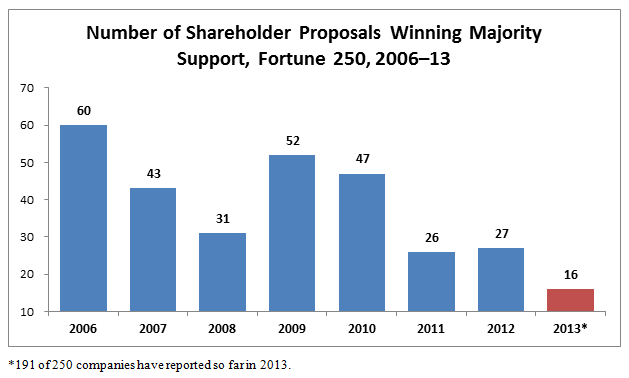
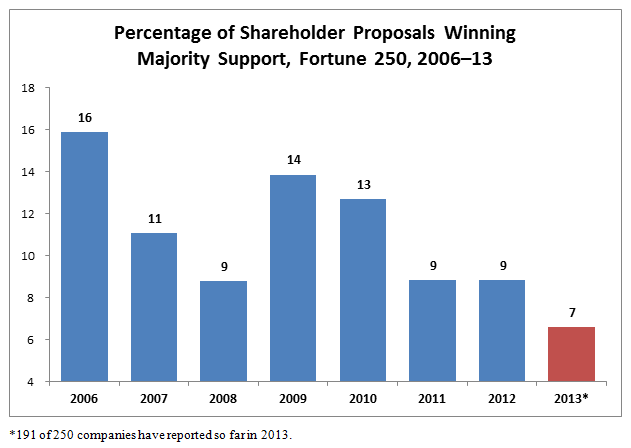
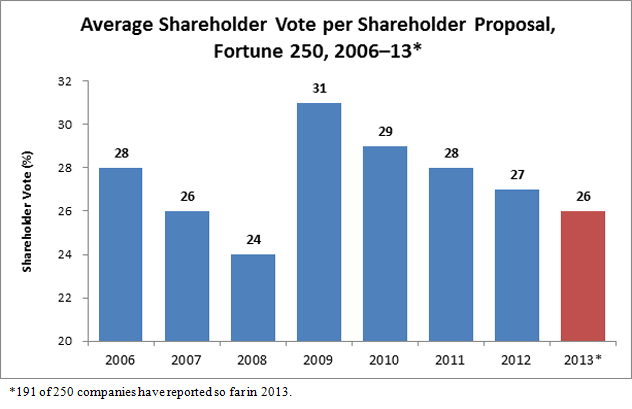
Shareholder proposals in 2013 have averaged 26 percent support from shareholders, down from 27 percent in 2012 and lower than every year since 2008. Despite the significant drop in shareholder proposals winning majority backing, the average vote for shareholder proposals has fallen only modestly, partly because of the aforementioned 2013 drop in the number of shareholder proposals filed that receive minimal shareholder backing, such as those involving human rights or animal rights.
The impact of the type of proposal introduced on voting results is evidenced by the fact that board declassification is the only class of shareholder proposal to win the support a majority of the time (86 percent of such proposals have passed in 2013, and 81 percent dating back to 2006). Two of five proposals seeking proxy access for shareholders’ director nominees have received majority support in 2013, and one-third of such proposals have passed since 2006 (though only among a small sample size of nine). Some 38 percent of proposals involving shareholder voting rules have passed in 2013—though the average vote total for such proposals has been 52 percent, showing relatively strong shareholder support—as compared with 31 percent dating back to 2006 (with 45 percent average support). (Historical shareholder vote totals for this class of proposal are depressed by the large number of cumulative-voting proposals, only 3 percent of which have won majority shareholder backing; 46 percent of majority voting proposals have passed dating back to 2006.) Support for proposals seeking to permit shareholders to act outside annual meetings through written consent, or by calling special meetings, has waned in 2013: only one such proposal has received majority shareholder support this year (5 percent of the total), while 30 percent of such proposals received majority support dating back to 2006.
In general, all other classes of proposal have been very unlikely to win the backing of a majority of shareholders—in keeping with historical norms. Only one proposal seeking to separate the chairman and CEO has passed in 2013—4 percent of the number of such proposals introduced, exactly in line with the likelihood of passage for such proposals dating back to 2006. No other proposal type has received majority support this year—again, largely in line with historical trends. Dating back to 2006, among proposals involving political spending or lobbying, the environment, or other social issues, only one such proposal per subtype, respectively, has won majority support: the political disclosure and environmental proposals in question were backed by the companies’ board of directors, and a 2011 proposal introduced by the New York City pension funds urging KBR to amend its equal-employment-opportunity policy to include sexual orientation received 55 percent of the vote. The average 2013 shareholder vote for political spending or lobbying proposals, 18 percent, is essentially unchanged from 2012, and marginally below the level seen across the full 2006–13 time span.[12]
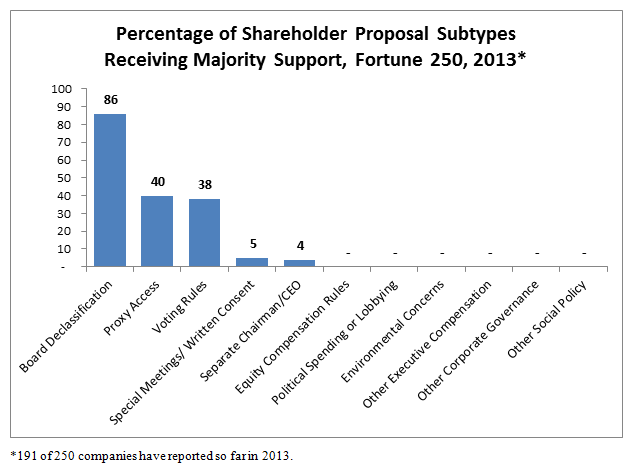
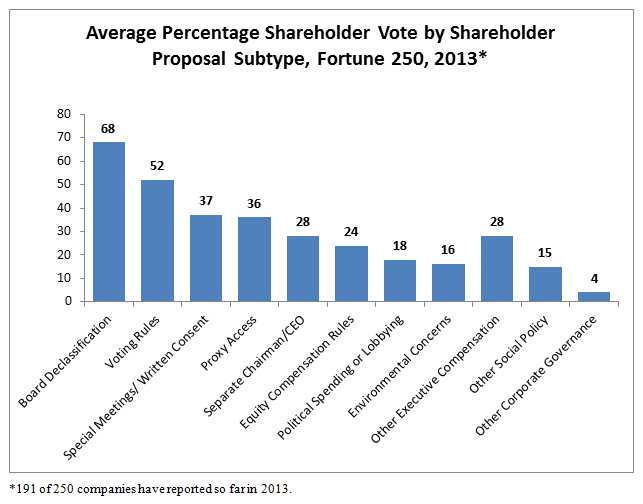
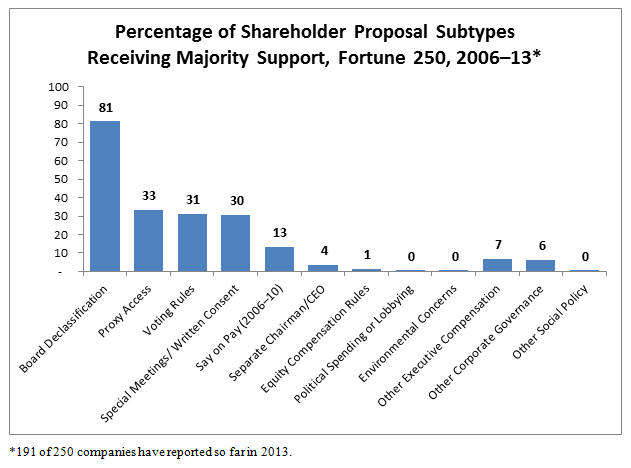
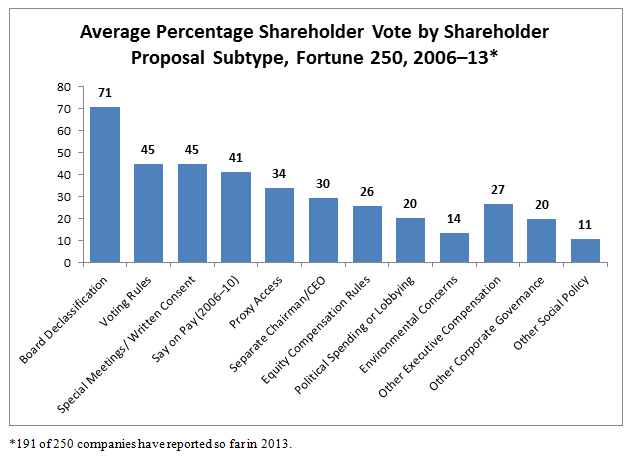
Say-on-Pay Voting Results. At its May 16 annual meeting, Apache Corporation became the second company in the Fortune 250 to fail to receive majority shareholder support, narrowly missing, with 49.82 percent of the vote. (Navistar had received only 17.83 percent of the shareholder vote at its February 19 meeting.) The proxy advisory firm Institutional Shareholder Services (ISS) recommended a vote against the Apache executive-compensation package. Apache filed an amendment to its proxy objecting to ISS’s recommendation, partly on the grounds that ISS’s peer-group selection was inappropriate: half of the companies that ISS selected as Apache’s peers were not, like Apache, in the oil and gas sector, and many of them had a significantly smaller market capitalization—as little as 10 percent of Apache’s size.[13] Also, in 2013, seven other companies received 50 to 60 percent shareholder support for the executive compensation, and another eight received 60 to 70 percent.
Other Highlights. In May, two corporations held annual meetings of significant interest flagged in the 2013 Proxy Monitor Finding 2: Hess Corporation, which faced a proxy fight with the hedge fund Elliott Associates;[14] and JPMorgan Chase, which faced an effort from labor-affiliated investors in support of a shareholder proposal seeking to separate the positions of chairman and CEO, held since 2006 by Jamie Dimon. On the eve of Hess’s May 16 meeting, Elliott reached an agreement with Hess management to support the board’s five nominees, in exchange for adding three of Elliott’s nominees to the board, with the board maintaining its size because of retirements.[15] The unions’ efforts at JPMorgan Chase were not so successful: their chairman/CEO proposal received only 32 percent of the vote, 8 percentage points fewer than the same proposal received in 2012.
ENDNOTES
- Pub. L. No. 111-203, 124 Stat. 1376, §951 (2010).
- See Proxy Monitor, Reports and Findings, http://proxymonitor.org/Forms/reports_findings.aspx (last visited Apr. 11, 2013).
- Throughout this finding, 2013 results reflect the 210 proxy statements filed by June 4 and voting results from the 191 companies to have met by May 29.
- Pub. L. No. 111-148, 124 Stat 119 (2010); James R. Copland, Proxy Monitor 2012: A Report on Corporate Governance and Shareholder Activism, 13 (Manhattan Inst. for Pol’y Res., Fall 2012), available at http://proxymonitor.org/pdf/pmr_04.pdf.
- Amendments to Rules on Shareholder Proposals, Exchange Act Release No. 40,018; 63 Fed. Reg. 29,106, 29,108 (May 28, 1998) (codified at 17 C.F.R. pt. 240), http://www.sec.gov/rules/final/34-40018.htm#foot9 (“If the proposal deals with substantially the same subject matter as another proposal or proposals that has or have been previously included in the company's proxy materials within the preceding 5 calendar years, a company may exclude it from its proxy materials for any meeting held within 3 calendar years of the last time it was included if the proposal received: (i) Less than 3% of the vote if proposed once within the preceding 5 calendar years; (ii) Less than 6% of the vote on its last submission to shareholders if proposed twice previously within the preceding 5 calendar years; or(iii) Less than 10% of the vote on its last submission to shareholders if proposed three times or more previously within the preceding 5 calendar years”).
- The remaining labor-affiliated investors are not affiliated with a particular pension fund (e.g., the Marco Consulting Group).
- As noted in Finding 2, Copland, 2013 Proxy Season Under Way: JPMorgan Chase Chairman Vote Looms Large in Busy May Proxy Season (Manhattan Inst. for Pol’y Res., Finding 2, 2013), http://proxymonitor.org/Forms/2013Finding2.aspx, Occidental shareholders overwhelmingly voted against executive chairman Ray Irani , and an Irani ally, independent director Aziz Syriani, withdrew on the eve of the annual meeting after being opposed by many shareholders. Many shareholders also opposed the three incumbent JP Morgan directors on the risk-management committee, although these directors did narrowly receive majority shareholder support.
- Copland, Proxy Monitor 2011: A Report on Corporate Governance and Shareholder Activism, 12 & 14 (Manhattan Inst. for Pol’y Res., Fall 2011), available at http://www.proxymonitor.org/Reports/Proxy_Monitor_2011.pdf.
- See David F. Larcker and Brian Tayan, Union Activism: Do Union Pension Funds Act Solely in the Interest of Beneficiaries?, Stanford University Closer Look Series No. CGRP- 30 (Dec. 11, 2012).
- Pub. L. No. 93-406, § 514, 88 Stat. 829, 897 (1974) (codified at 29 U.S.C. §§ 1001-1461 (2006)).
- See Copland, supra note 8, at 16-18.
- Finding 5 will examine 2013 shareholder voting on political-spending-related proposals in historic context, in more detail.
- Apache Corporation, Proxy Statement Pursuant to Section 14(a) of the Securities Exchange Act of 1934, Definitive Additional Materials (May 1, 2013), available at http://www.sec.gov/Archives/edgar/data/6769/000119312513192941/d528930ddefa14a.htm.
- Elliott founder and principal Paul Singer is chairman of the Manhattan Institute for Policy Research but has had no involvement with the preparation of this report.
- Hess Corporation, Proxy Statement Pursuant to Section 14(a) of the Securities Exchange Act of 1934, Definitive Additional Materials (May 16, 2013), http://www.sec.gov/Archives/edgar/data/4447/000089882213000219/hessjointrelease5-1613.htm.